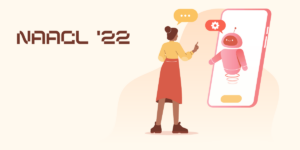A new tradition kicked off vigorously August 18 at the Information Sciences Institute Intelligent Systems Division, as eight grad students specializing in AI presented their research in a prize competition.
The goal of the event, according to ISD director Yigal Arens, is for students to learn and practice crucial communication skills – poster making, oral presentation, written papers – required (along with scientific insight) for successful careers in IT.The inspiration for the event came from natural language expert Kevin Knight, based on a longstanding similar competition held at Carnegie-Mellon University.
The symposium was organized by AI PhD students Donovan Artz, Martin Michalowski, Matthew Michelson and Snehal Thakkar. Sixteen faculty and students volunteered to read and judge the papers, and a full house of more than 50 researchers and students convened on the date to look, listen and (for presentation and posters) vote.

Yolanda Gil (right) awards best paper prize to Martin Michalowski (photo by Rattapoom Tuchinda)
Eight students and eight faculty volunteered to read and judge the papers, and a full house of more than 50 researchers and students convened on the date to look, listen and (for presentation and posters) vote.
First and two runner-up prizes in the form of bookstore credits were given in each category, all in the two-digit range. ISI startup Fetch Technologies’ contributions sweetened the prize pot, and the company also sent representative to present a talk on its activity.
The winners:
Best paper: Martin Michalowski. Runners up: Donovan Artz, Brent Lance
Best poster: Matt Michelson and Snehal Thakkar. Runners up: Jacob Evarist, Shumin Wu
Best presentation: Michal Rubenstein. Runners up: Brent Lance, Martin Michalowski
Best reviewer: Jonathan May
Kevin Knight bridged the hiatus while votes were counted with a cheerfully bogus discussion of entirely fictitious and meaningless scientific issues.
The real presentations covered a wide range of topics, including teaching machines to see unusual events ; evaluating the reliability of web information, synthesizing geographical and text; and programming computers to interpret the emotional meaning to of human gaze.
Next year, the organizers hope, the list will be longer and the prizes larger.
Here are the winners:

(left to right:) Jacob Everist, Jonathan May, Shumin Wu, Matt Michelson, Donovan Artz, Martin Michalowski, Snehal Thakkar, Michael Rubenstein, Brent Lance, Lei Qu. (photo by Rattapoom Tuchinda)
Here’s this year’s list of projects.
Nature Inspired Morphallaxis for Self-Healing Systems: Michael Rubenstein & Wei-Min Shen.
Extracting Gaze Manner from Motion Capture Data: Brent Lance
An Information Integration Framework that Supports Unstructured Sources: Matthew Michelson & Snehal Thakkar
Surprise-Based Event Detection with Limited Sensor Information: Jacob Everist and Wei-Min Shen
ITA: An Attempt to Simulate Tutor Feedback in a Game- based Language and Cultural Training System: Shumin Wu
Modeling The Learners Engagement Using Bayesian Networks: Lei Qu
Using Data Fusion for Constraint Inference in Geospatial Data Integration: Martin Michalowski
A Study of Factors that Affect Trust in Information on the Web:Donovan Artz
Published on August 18th, 2006
Last updated on August 9th, 2021











